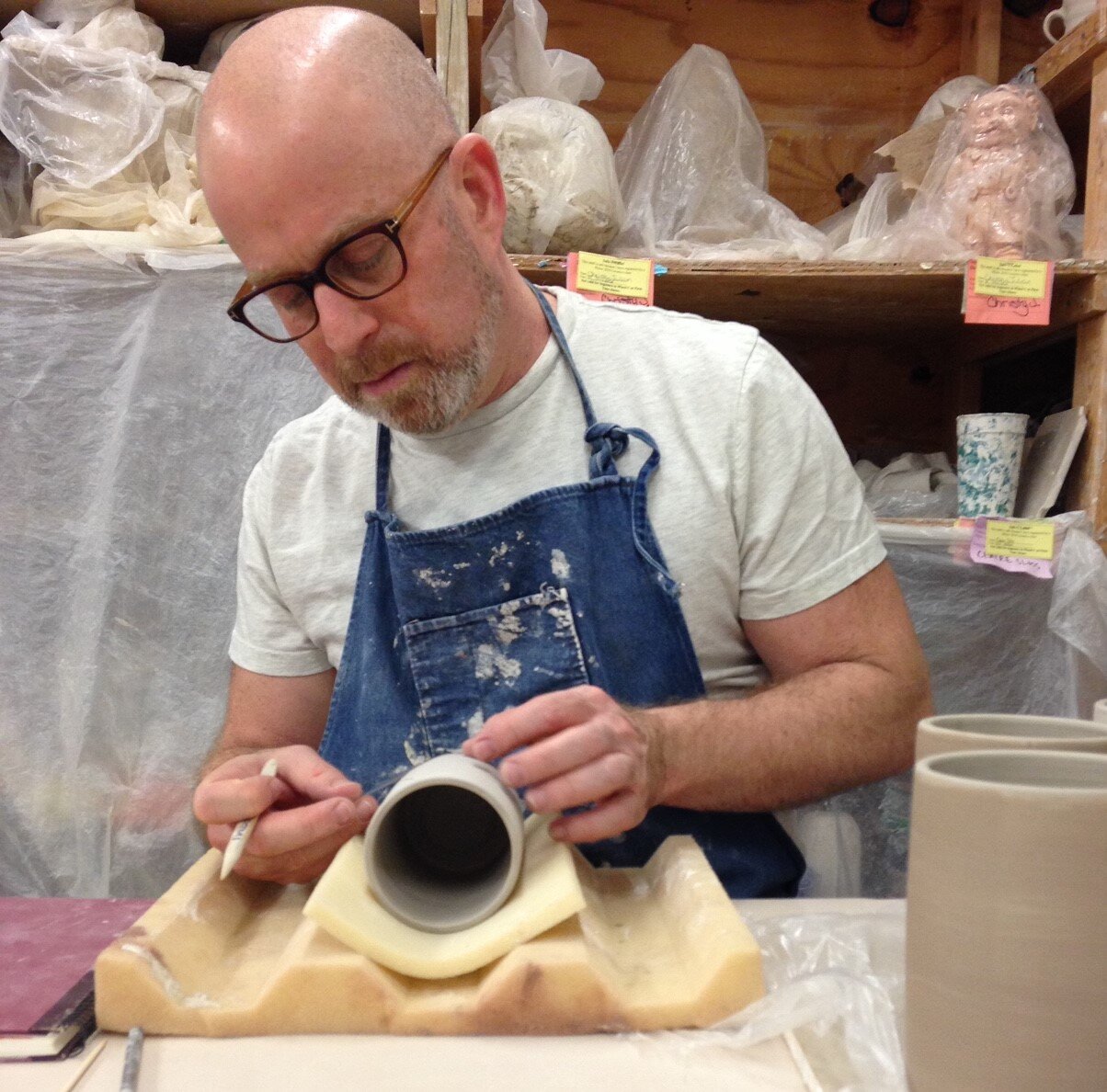
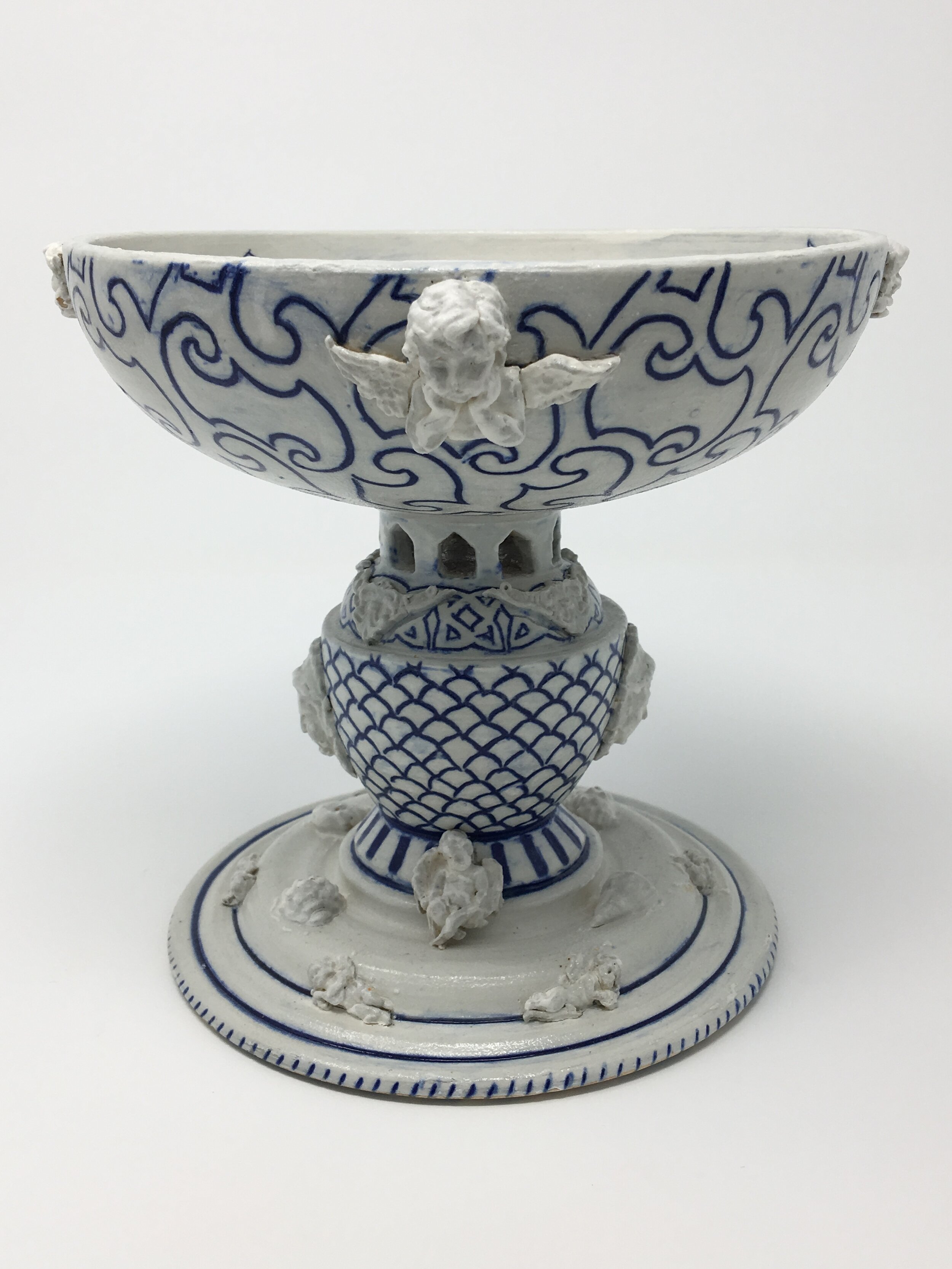
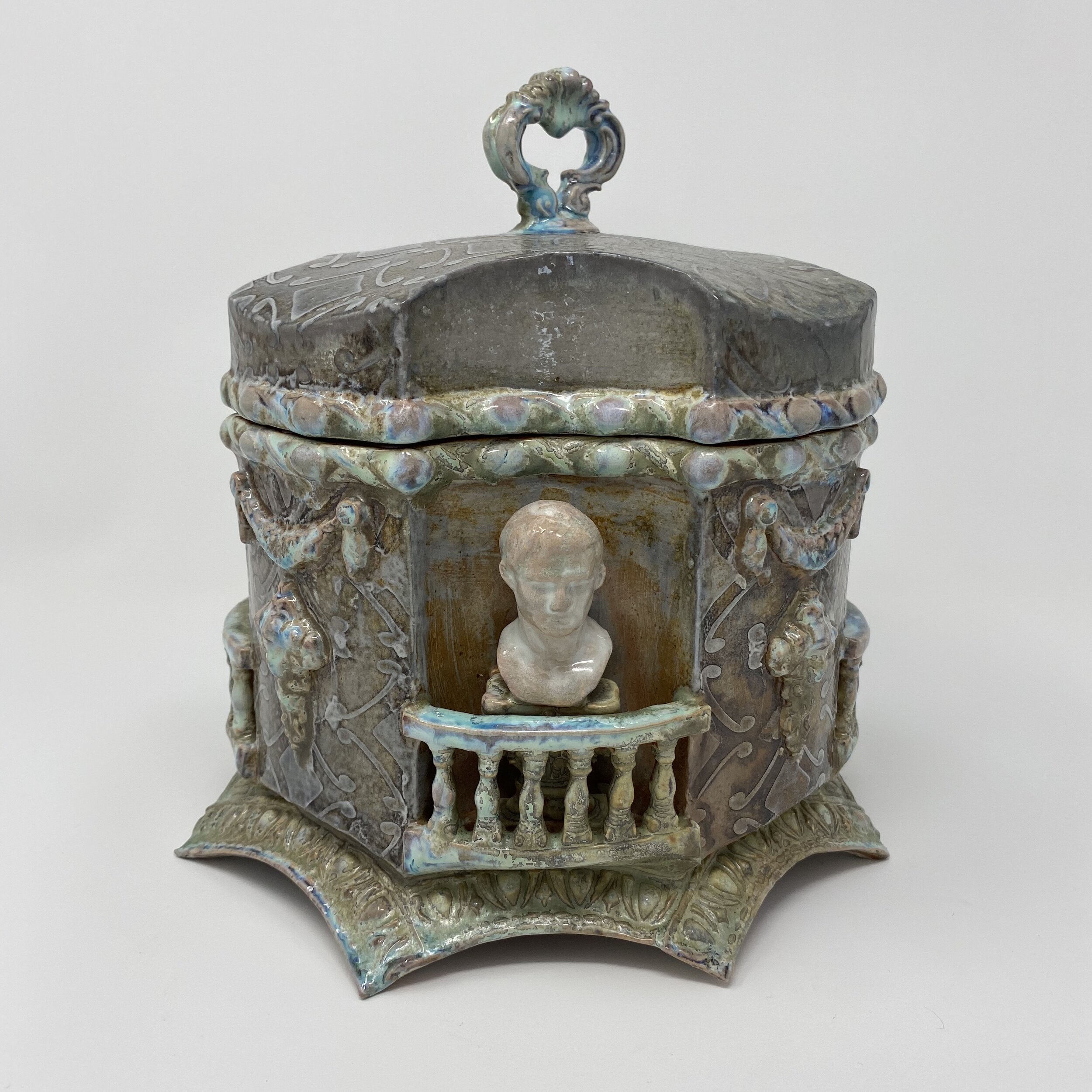
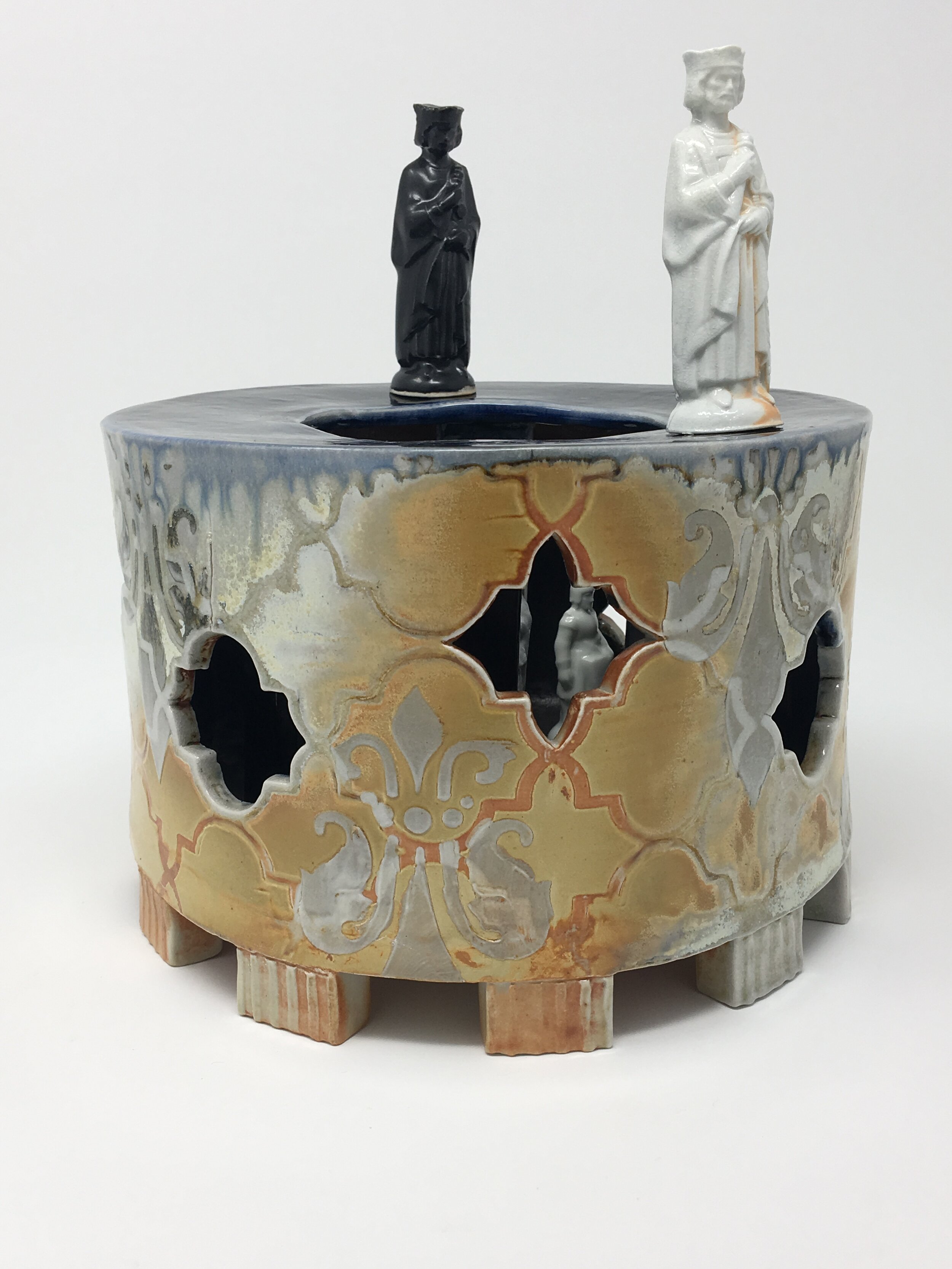

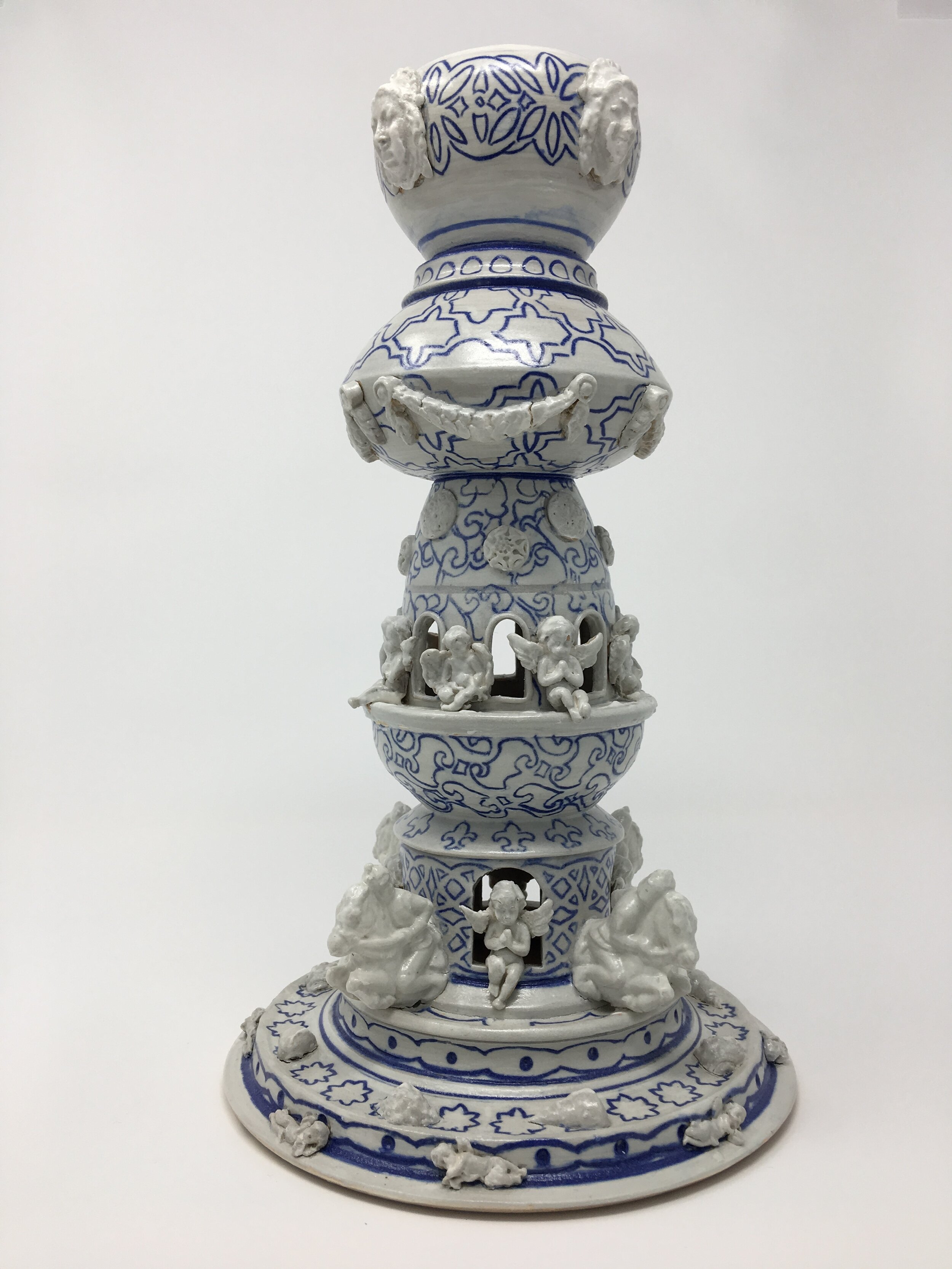
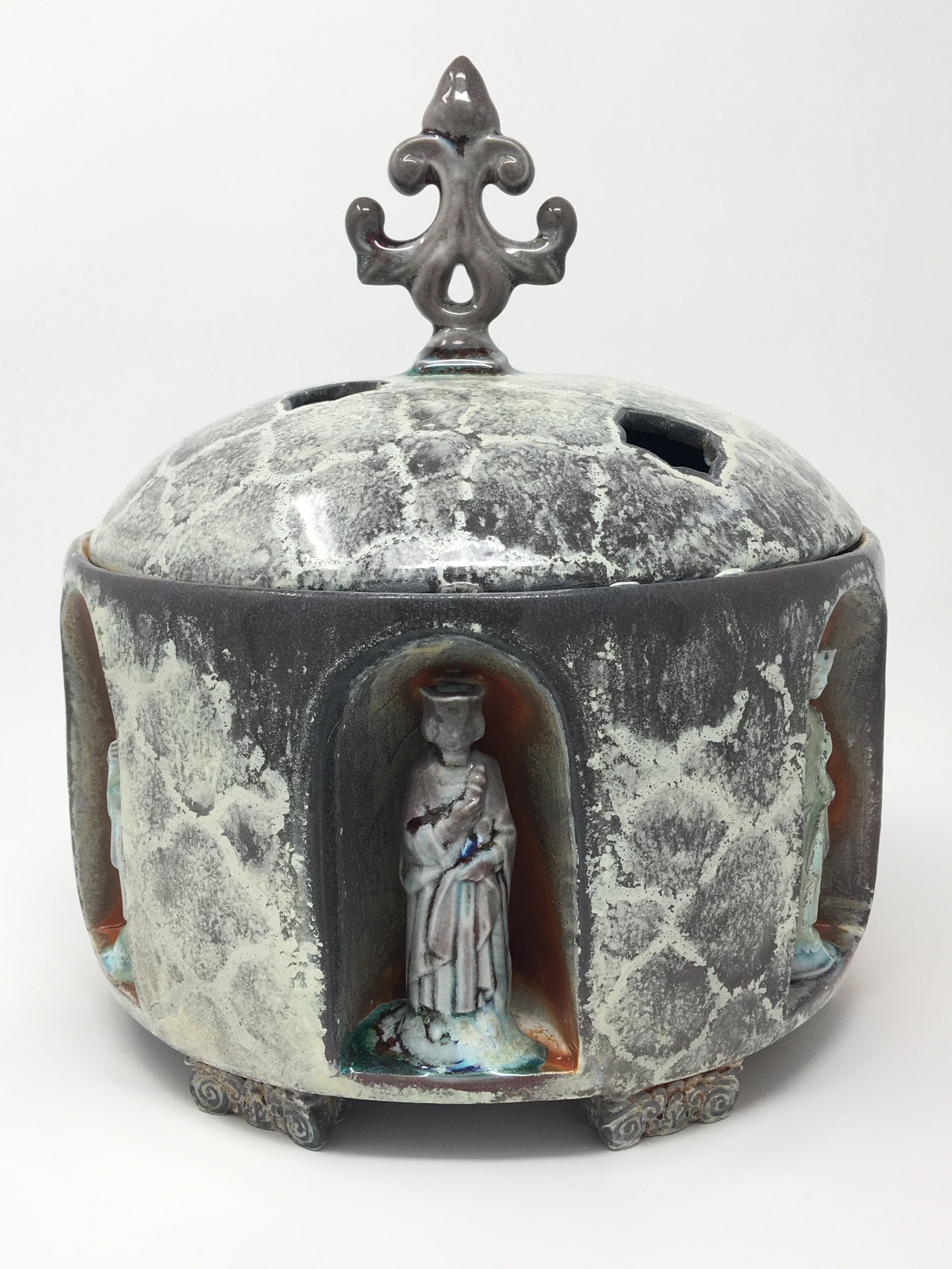
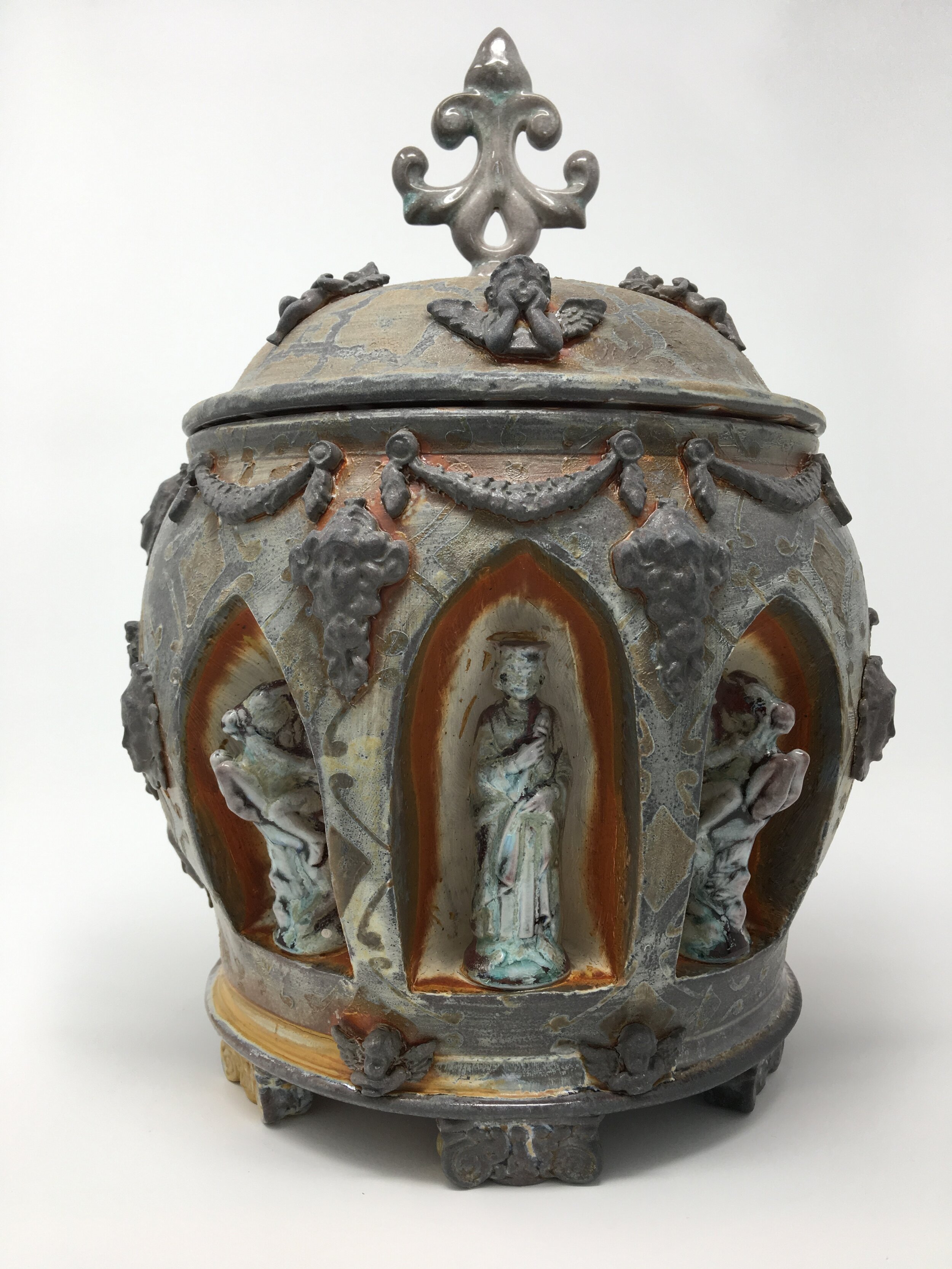

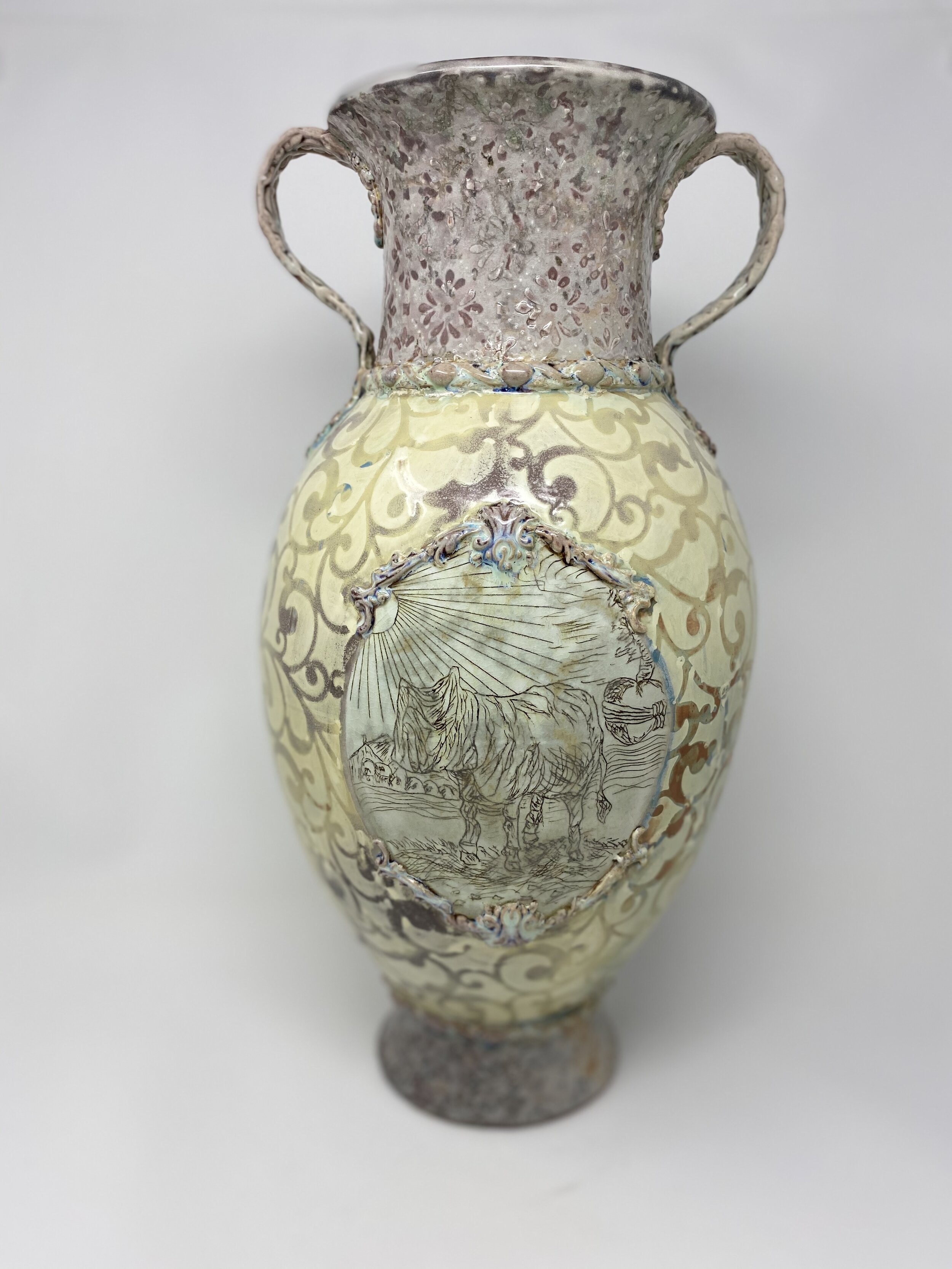
Eric Doctors (00:40): My family is originally from the Boston area. That family originally was in the garment industry, and everyone was a sewer, you know, back in the day in the twenties. And everyone had a sewing machine, all the men, they all worked in, in factories, you know, as cutters. And so when I was a kid, there were, there was some sort of carry over and in our family my mother and my sister and I did a lot of needle kind of work kind of thing. So making quilts, needle pointing knitting, crocheting, macrame, everything like fibery. And then my mom took a ceramics class. She brought home stuff. I said, Alex, really cool. I want to try that. And so I, about 13 or 14, I went and took a class and the guy that was doing it, he showed how to do it on the wheel. And I thought, Oh, I think I could do that. And I sat down and I just did it. I just, I just, no one really had to teach me. I just sat down and just started doing it. It was, it just came naturally to, yeah, it was just happened. And I was, I was, I caught the bug and that was it. I even know. I still know the guy that was my teacher. You're kidding me. No, Eric Jensen. He's a ceramic and it's been active for a long time. So our paths just kept crossing throughout my life, but he kicked me off. He was a young artist to just out of school of teaching there and he got me started. Nice.
Ricky McEachern (02:15): Now that activity was around using the wheel, is that correct?
Eric Doctors (02:19): Yeah, it was a wheel throwing class.
Ricky McEachern (02:21): Oh, a whell throwing class . Okay. Now, was there something specific about wheel throwing that It turned you on or Would it have been any sort of creative,
Eric Doctors (02:32): Creative activity? Why is turned on by pretty much any creative activity, but that one in particular, you know, there's this magic thing that happens. Like you take a lump of clay, you throw it on the wheel and you put your hands in some water on it. And it goes from just being this lump to being, you know, like a copper bowl or about like, you can, like, in a matter of minutes you've created something that has either some, you utilities, some visual kind of expression. I just, it just felt like, Oh, this is, it felt like magic. Like I could just make stuff.
Ricky McEachern (03:10): I've never done it. And a friend of mine, my friend, Paul Schultz, he is part of the Lincoln square pottery studio. Are you familiar with that? And he's always trying to get me to be part of it and try it out. So at some point I will, but it does sound very interesting and it sounds interesting. I mean, obviously I'm a painter, so I'm used to using my hands to create things, but I'm using a brush and there's something about the idea of touching and this thing spinning in your hands. And it just looks like it would be a very interesting,
Eric Doctors (03:52): It's very direct and it's, it's physical, your hands just go where they need to go. And all of a sudden you have something that has some, some connection, you know, as connection pottery has been around for tens of thousands of years. And, you know, because it comes out of a utilitarian and ritual kind of background, but there's something that just people just picked up piles of dirt and just started making stuff.
Ricky McEachern (04:17): When you're doing a project, do you plan it out ahead of time or is it something where you throw the clay on and you just sort of see where things go? Like how much of it is planned out and strategized and how much of it
Eric Doctors (04:31): Let's see what happens? It's a bit of a combo. So I have, I think I dream a lot in art possibilities, waking and sleeping dreams. So it's like a constant film of ideas streaming through my brain. And I, I, so I'll get inspired by something that I see in my mind, like a vessel or an abstract kind of sculpture. And I'll also get stimulated by things I see out in the world, other people's art or nature architecture, anything. And so in my mind I say, Oh, that's interesting. What do I want to grab on to out of that? Is there some sort of something what's speaking to me in now, what do I want to bring it to be? But then when I go to make, it becomes very intuitive. So I ha I start with an idea like, Oh, okay, maybe this pattern or this shape or this combination, or, you know, and then I'll, I'll start, I'll pick an entry point, but as I make, it becomes more intuitive, you know, more playful experimenting.
Ricky McEachern (05:42): Okay. Now, do you write down what you're seeing in your dreams so that you can remember it or do you just remember it?
Eric Doctors (05:50): Not so much every once I'm a really bad journal alert, but every once in a while I think, Oh, I should be journaling or taking down thing. I have all sorts of journals with random notes that are all like a quarter full. Okay.
Ricky McEachern (06:02): But does that mean that you remember what was in your dreams?
Eric Doctors (06:06): Sometimes, Hey, it doesn't work for me that way. I just the creative creativity is like a flow thing for me. I just need to, once I'm in the studio, I just go and go and go and go and, and allow myself to get carried along. It's hard to describe. I think it's hard to verbalize it. It just, it happens for me. It always happens. Makes sense to me.
Ricky McEachern (06:33): Now, I know that I dream sometimes of painting ideas. Oftentimes abstract painting ideas. I'm not an abstract painter and in my dreams, the stuff is incredible. And I can never really remember it. I usually remember it when I first wake up, but then it dissipates. And I feel like the stuff that I can create in my dreams is exceptional. Like better than anything that I create in the real world. And so what that means to me is that my brain has this capacity to create all of this amazing stuff. And so I'm always trying to, in my waking moments, how do I access that stuff? Cause it's in there. How do I access it when I'm awake?
Eric Doctors (07:19): Yeah, I it's similar for me. I feel like there's tends to be residual things that just keep showing up the same kind of formal shapes or like I have this relationship that with my, for my whole life with mathematics and geometry and it just Hatteras and design elements, just keep coming back over and over and over. And at this point I just respect that it's there and I say, okay, where's the energy for that? And I just try it. I don't feel that I'm going to able to make yield to make those fabulous things. I see in my dreams exactly the way that I see them, but I feel there's something in just trying to try, you know, just like, Oh, well, let's play with that. That just keeps showing up. There's something in that.
Ricky McEachern (08:13): Do you have a background in mathematics?
Eric Doctors (08:15): I do. So my undergrad is of all things in ceramics and math. My degree is officially in visual arts, but I was, I was like two classes shy of having a full degree in math. Wow. And I leveraged the math to have a professional life to support the ceramic life.
Ricky McEachern (08:36): Did math become something that you were interested in? Was that always something when you were a kid?
Eric Doctors (08:41): Yeah. It, my dad was an engineer worked for NASA early NASA. He used to teach me algebra and calculus when I was about five or six. And so I, I was, math was just something that naturally came to me. I just always, always did it. I got to school and I was still curious about it.
Ricky McEachern (09:04): So my degree, I don't know if you know this, but my degree is in engineering. So I have a very, obviously a strong background in math. What's interesting about math for me is and this is interesting that, you know, math and ceramics, because you mentioned like geometry and I always felt that geometry was very intuitive. When I remember it, you take honors geometry freshman year in high school. And I remember, I thought it was obvious. Like I almost was thinking, how is this even a class? Like all of this seems so obvious to me. And I remember there were kids struggling and I'm like, like, how are you struggling with this? Like, it all just made complete sense to me. But when you look at things such as the timestables that you learned in fifth grade, like I struggled with that because it didn't have any spatial relevance to me.
Ricky McEachern (10:01): It was just memorization of, of information. And I couldn't write, I couldn't memorize it. Like for instance, if someone gives me a phone number, I can't, I can't remember it because it doesn't have any, it has no meaning. It's just like random numbers. And so I struggled with math, you know, early math. And then when it got to more advanced math, like geometry and especially calculus, I thought calculus was brilliant. And I got all A's. I thought it was really, I wouldn't, I wouldn't say it was easy, but it certainly, I could understand it very, very easily. I can see how the two would go together for you mathematics and the, you know, the process of making these ceramic items.
Eric Doctors (10:46): Absolutely. So I think word, I started figuring out by later in high school and then into college was math was a language it's a universal language and understanding as a language like vocabulary and syntax and telling stories in looking at it that way and less about getting the right answer to a problem, made it a really create, it was like creative writing to me. And, and that's how I learned it in college, in what? And so there was a lot of overlap for me between art and math. I felt like they lived in the same arena in my brain and how I thought about, you know, I was curious about, and I, I ended up being a teaching assistant in both departments. And I used to have, I used to have a chalkboard in this ceramic studio and I have all the students that I was TA and tutoring come to the ceramics studio and touch clay.
Eric Doctors (11:47): While we talked about where they were struggling with their passing, their advanced algebra or whatever, was that helpful to them? Oh, they loved it. Yeah. It was. Cause it was like, cause it got, because it took it from, they had all been conditioned to getting the right answer versus thinking of it as like, Oh, I'm just learning a different way of thinking. Yeah, no, I can, I can organize the world or understand the world through the lens of mathematics, you know? So I used to get and tell stories. They used to get, you know, like let's, let's just turn it into something different.
Ricky McEachern (12:20): When did you, when did you make that realization? That mathematics is a language, it sounds like that shifted your viewpoint on that.
Eric Doctors (12:29): It was, it started later in high school. I had a really good friend that was also an artist and a math person and he, and I would talk a lot about this stuff and just explore ideas and read and just have conversation. And it's interesting. Cause now he's he's a math professor.
Ricky McEachern (12:48): Do you think the fact that you were exposed to math so early made you more? Cause a lot of kids are just intimidated by mathematics and it sounds like it was because your dad was an engineer, he exposed it to you. Do you think that that was helpful in that you just weren't intimidated by it? Or it was something that was in the home?
Eric Doctors (13:08): Yeah, I think they made a big difference. I think it was also in a lot of really good teachers cultivated that as well. So I was, I was an athlete in high school, you know what I mean? I used to stay after school do that. So that was, cause it was fun. It was a fun and engaging thing to do.
Ricky McEachern (13:33): Yeah. I want to share with you a where things shifted for me with math when I T so I always thought of math as something that was kind of just invented. Like, I didn't think that it had a real use. I knew that you have your times tables and so you can arrange, you know, three eggs by three eggs. And so three times three is nine and that's how many eggs that you have. And then we would do algebra word problems, but it never had real relevance to me or it wasn't until I took physics. And when I took, I assume you took physics. Okay. And when I took physics and that's when I realized that math is actually the language of the universe, the way the planets move, the way that atoms move, the way that rockets move everything, all of this stuff is mechanics, which it can all be explained, not estimated it's not just an estimate or an approximate. It's actually a hundred percent accurate with mathematics. I did not realize that until I was a freshman in high school. Which sounds a bit crazy, but I suppose some people never make that realization at all. And that's when I was like, Oh, like math is actually the language of the year.
Eric Doctors (14:55): Yeah. That's how I look at it. And it's got poetry in it and you know, and emotion in it too, it's it? Isn't, it's not detached. It's very human. And which is super interesting to me as well. Like there's something about the use of mathematics. Like if you look at this L'Amic argument, for instance, where they have non-representational art, but they use pattern those patterns the way they repeat, they have this certain kind of expressiveness that has an emotional content to, you can make some, you can make something using a pattern really tight, you know, and like dance. And it feels that way where you can have it really be open and lyrical, you know, and fluid. And you know, it feels like long or the sky, like you can evoke these things, you know, and mathematics has that in it. It has so many things in it for me. You know, like the whole idea of what a golden section is, you know, like this, this this idea of proportionality showing up everywhere in nature. Yeah. It shows up in all this architecture, it shows up like this shell, the same proportion, it shows up in the Nautilus shell and shows up in the great pyramids and shows up, you know, in the Parthenon and in DaVinci's drawings, you know, it just shows up everywhere. The Gothic cathedrals, it just keeps showing up everywhere, the same proportion everywhere.
Ricky McEachern (16:29): So who knew the two of us have a background in math and science? Well, Matthew me more science and we're both creative individuals. Did you, you were doing something before you were a ceramic artist full time. You had a career. Can you tell me a little bit about what that was?
Eric Doctors (16:52): Sure. So when I got out of school, I had this degree in art, math, and I became a actuarial consultant in requires that you pass all these exams and get certified. And it worked out. I ended up being able to have that work, to support myself as an artist for a long time. And so I did, I was a consulting actuary for a couple of different companies over a 26 year period. And along the way, I got really interested in how people learn and develop because, because I come in through the back door in this profession and I was able to shift gears and end up essentially leading the function that helps people learn how to become actuaries. I became a learning what's called a learning and development professional. And I also convinced the company I work for. So let me work three days a week.
Eric Doctors (17:39): So I could go do my studio art. I got deeper, deeper, and an interest in how people learn. And so I made a full conversion over to that field and went and got a master's learning and organizational change. But the whole time I kept my hand in the creative pie, I got really curious about how the connection between people and organizations, you know, what works for people, what works for organizations in that? It was very my orientation. She was very creative. So I, I tended not to be a go by the book kind of person on those things. And I ended up leading the efforts to figure out how people can best thrive in organizations and do what they want. And the organization gets the best out of their people. And I did a lot of kind of creative approaches to doing that that were very nonstandard. So I definitely brought an artist perspective. So
Ricky McEachern (18:41): It sounds like you were not afraid or you were very open or eager to look at things in a fresh way, a new way. You weren't always following the rules. You weren't always necessarily doing what you were told. I don't mean that in like a rebellious way, but you were looking for new ways. Was that because you are looking for ways to, To make what you were doing more interesting for you
Eric Doctors (19:11): Certainly was a part of it. Like I was relentlessly curious about things and easily bored all the time. So looking for like connections new ways of thinking about things like I want to think of, I felt dissatisfied with what I saw and experienced as an employee and for these businesses. And I felt that they were missing important things that they, and I was seeing it in a new way. And so I felt like, Oh, it made me very, I was very brave. Certainly I, I did not do the status quo things at all. And I was in trouble. I got in trouble a lot, sometimes good, sometimes bad, but I was an innovator. I was really innovative about all this. And I think it was driven by my creativity and curiosity. Yeah.
Ricky McEachern (20:05): What were you like as a little, as a kid in like elementary school? Well, like where you are well behaved. Eric Doctors (20:11): Yeah. For the most part I'm okay. I was hot, very, very high energy, always pretty high, like pretty positive. Like I was a happy kid for sure. Okay.
Ricky McEachern (20:27): The reason why I ask that as those attributes of being curious and easily bored makes me think of a young kid who might be easily distracted like in, you know, potentially disruptive in like elementary school, like, you know, as young boys as I was. But it sounds like that was not a, you were able to direct that in a non-destructive disruptive way.
Eric Doctors (20:56): Yeah. I had a couple, I had some moments where I did, I did bad things, but I never got caught because it was really creative about how I did it.
Ricky McEachern (21:05): Ooh. Okay. Well, that's, it doesn't count if you're not, it doesn't count if you don't get caught.
Eric Doctors (21:10): No.
Ricky McEachern (21:12): So I know that you have a show right now at gallery studio Oh. In the Ravenswood neighborhood of Chicago. And can you tell me about the show and what's in it?
Eric Doctors (21:26): Sure. So it's work that I've been doing over the last couple years and explores a couple of different things that have been on my mind. I have this idea a while ago about creating these vessels, these containers and other objects that they look, they look like they could have been dug up a thousand years from now, from now, from now, like they are artifacts of now. And if they didn't weather And they have Elements in them that point to ritual or point to things that were going on now, but they're, they're coded in the sense there. So it, so some of them, I call temples of creative fire because they, they, they are intended to represent what needed to be preserved from now, is this, what will you're losing touch with is our creative fire. And that there was a need to remember it preserve that. So we don't lose touch with it. Others of them are what I call alchemy of the heart, which have to do. It's more my response to what I see going on in the culture where we're also angry, or a lot of people are angry at each other or about things. They go around each other or talk past each other, screaming at each other. And I thought, that's not really going to get anything to change.
What really the path is through the heart. That's what we have in common. It's like, how do we, how do we take that anger and converted it to something like love or caring or something like that. So I made a whole series of pieces to explore through an alchemy kind of lens. And I, I referenced alchemy imagery from the 16th century, 17th century, some drawings and the other kinds of things that were all about alchemy. Cause I feel like that's a, that's a magic point or a plate, you know, like an opportunity to space that I, I wanted to point towards. And then the last batch of work that I've been doing is what I'm calling theater of change. Cause I feel like this is a moment of change. You know, we're institutions, structures, belief systems are starting to fall away and, and transmuted to other things. And I'm particularly interested in what's going around race, gender, sexual orientation, class structures. And so I I've been using these chess pieces and parts with wings to show that there is forces going out and forces coming in. And I created these kinds of stages where there are at least almost like a passion play playing out like, okay, this is what's happening. Who knew you could, you could say all that with ceramics, right? You can say a lot with ceramics. It's it's, it's endless.
Ricky McEachern (24:33): Apparently you can. And your show is at gallery studio in Ravenswood until when
Eric Doctors (24:41): July 18th. Okay.
Ricky McEachern (24:42): And it's 2020. So, so people know, and people could be listening to this a hundred years ago
Eric Doctors (24:47): For now or digging up the piece a thousand years from now and going, Oh, that was in that show.
Ricky McEachern (24:52): Well, what do you have to say to people that are listening to this who maybe are in fault in mathematics and they're not using the creative, artistic part of their minds, what would you say to someone about accessing that in terms of how to do it and why
Eric Doctors (25:11): People have said to me many times, all I'm not creative, I couldn't do what you could do. And I always say everyone's creative, just living as creative. So, and just to give it a try, just get your hands in something top something, paint something write something. It'll, it'll take you a place to you. That'll be exciting and interesting. Once you try, you might be really surprised by what you find it comes on.
Ricky McEachern (25:41): That's great advice. I always, I find it interesting that a lot of people say that that “I'm not creative, that I couldn't draw a stick figure”, but then if you look at how they are in business with relationships, with people and they Excel and understanding the dynamics, you know, between people, I feel like that's the same part of your brain. It's just using it in a different way because you know, dealing with people is all about understanding, nuance about seeing the differences and the differences between people and the relationships of between different things, different ideas, different personalities. And for me, that type of stuff is the same thing. When I'm creating a painting, I'm always looking at it's all about relationships. So I think that people are closer to being creative. Then they probably oftentimes they probably realize,
Eric Doctors (26:44): I think they Create an artificial distinction because living, being human and living as creative. Yeah, my definition and there's, I think there's an artificial separation. You know, when, when someone creates an object or something that's named as creative, it gets a certain kind of a distinction from just what people just, they don't think of the things that you described as being creative, but they are, they're accessing all those same parts of themselves that we access as artists in order to, you know, just to live
Ricky McEachern: well, this was wonderful. We had obviously never met. We've never met each other before. We had a brief conversation on the phone before we had this talk. And you never know, I had no idea about your mathematics background. So I'm so glad that you and I were able to talk today and get to get to know each other. This was a wonderful conversation.
Eric Doctor: Thanks. Yeah. It was really fun. I really appreciate it, Rick. I don't usually get to talk about myself, so it's sort of funny. You asked really great questions. Thank you.

